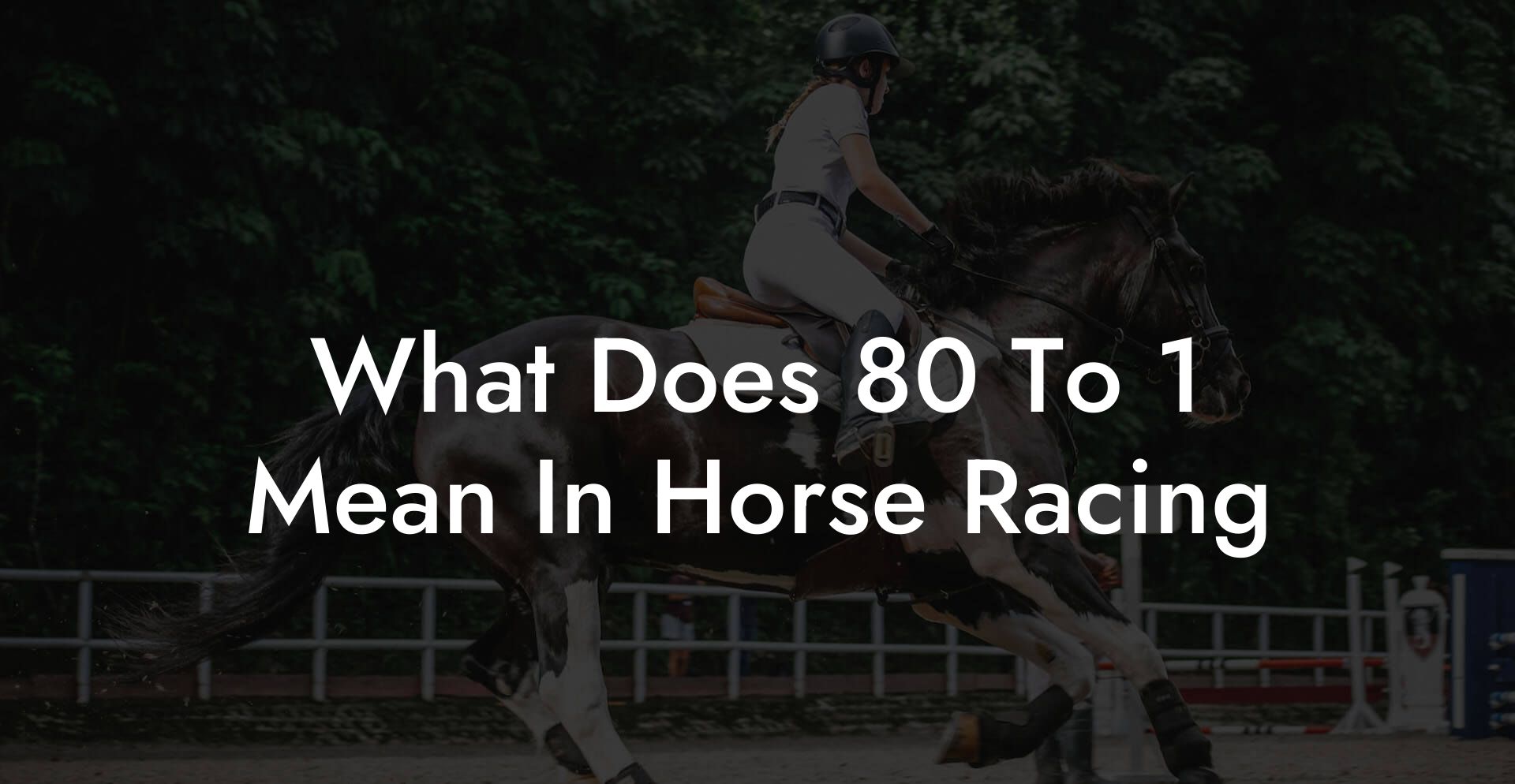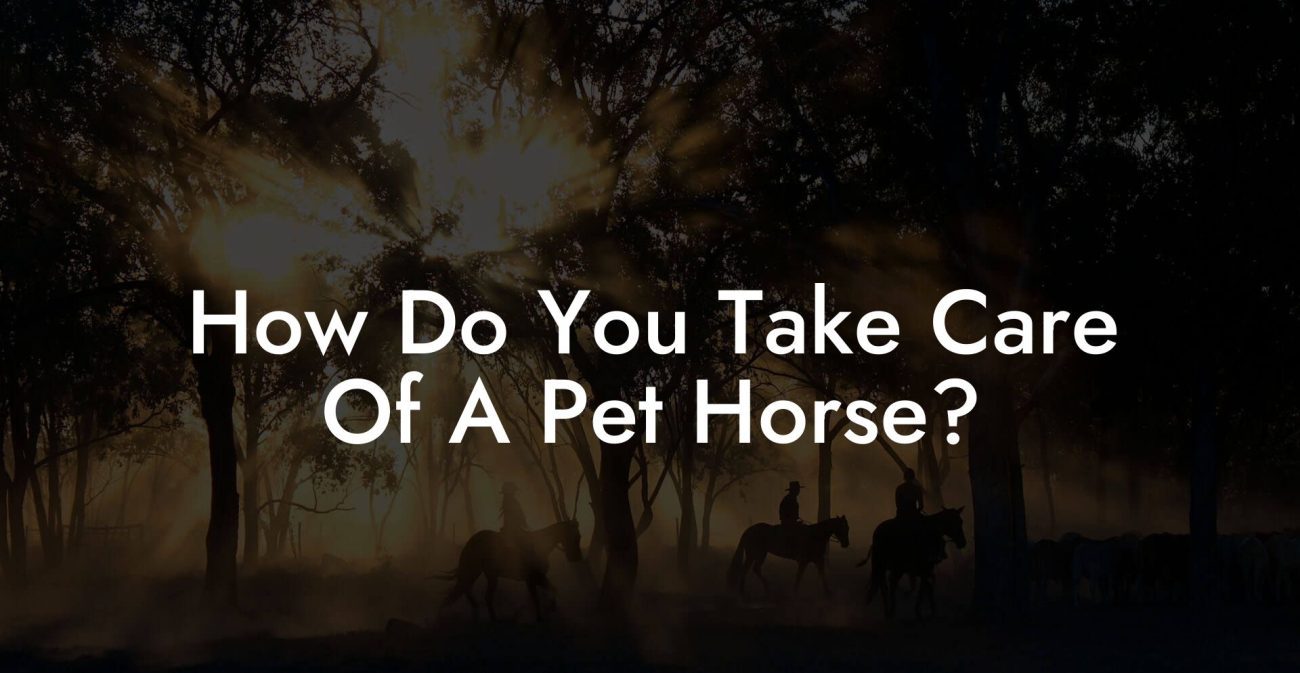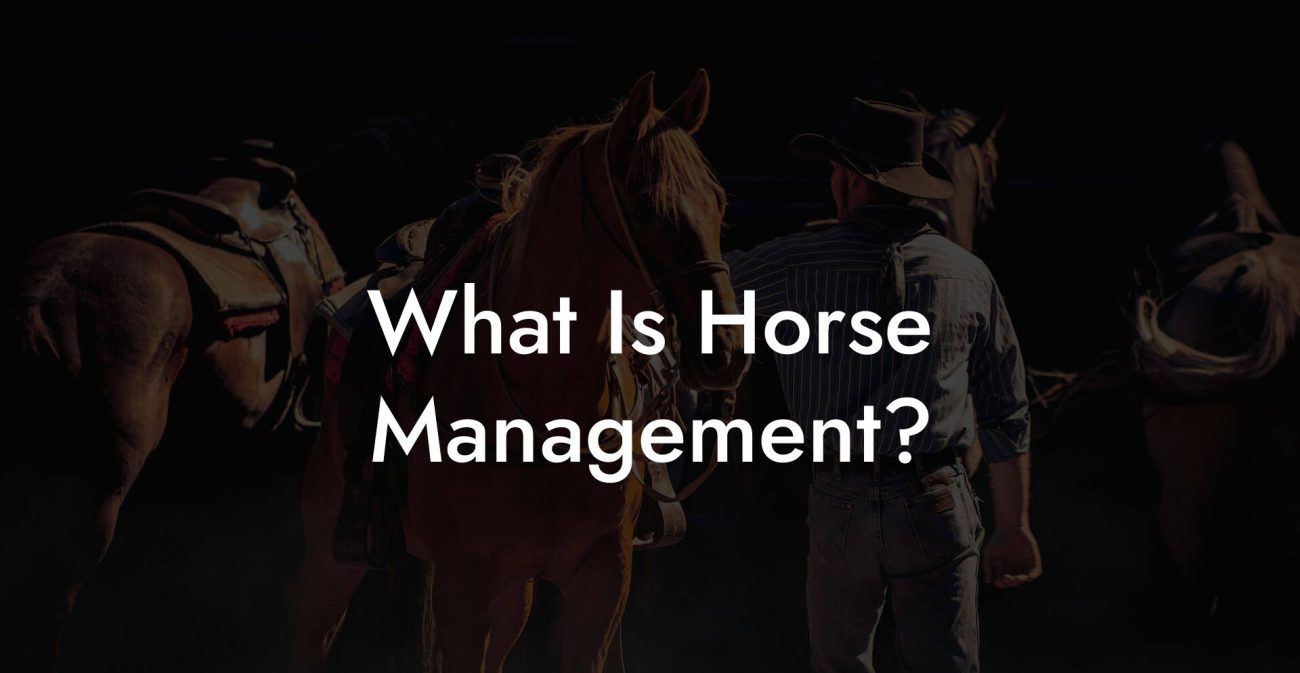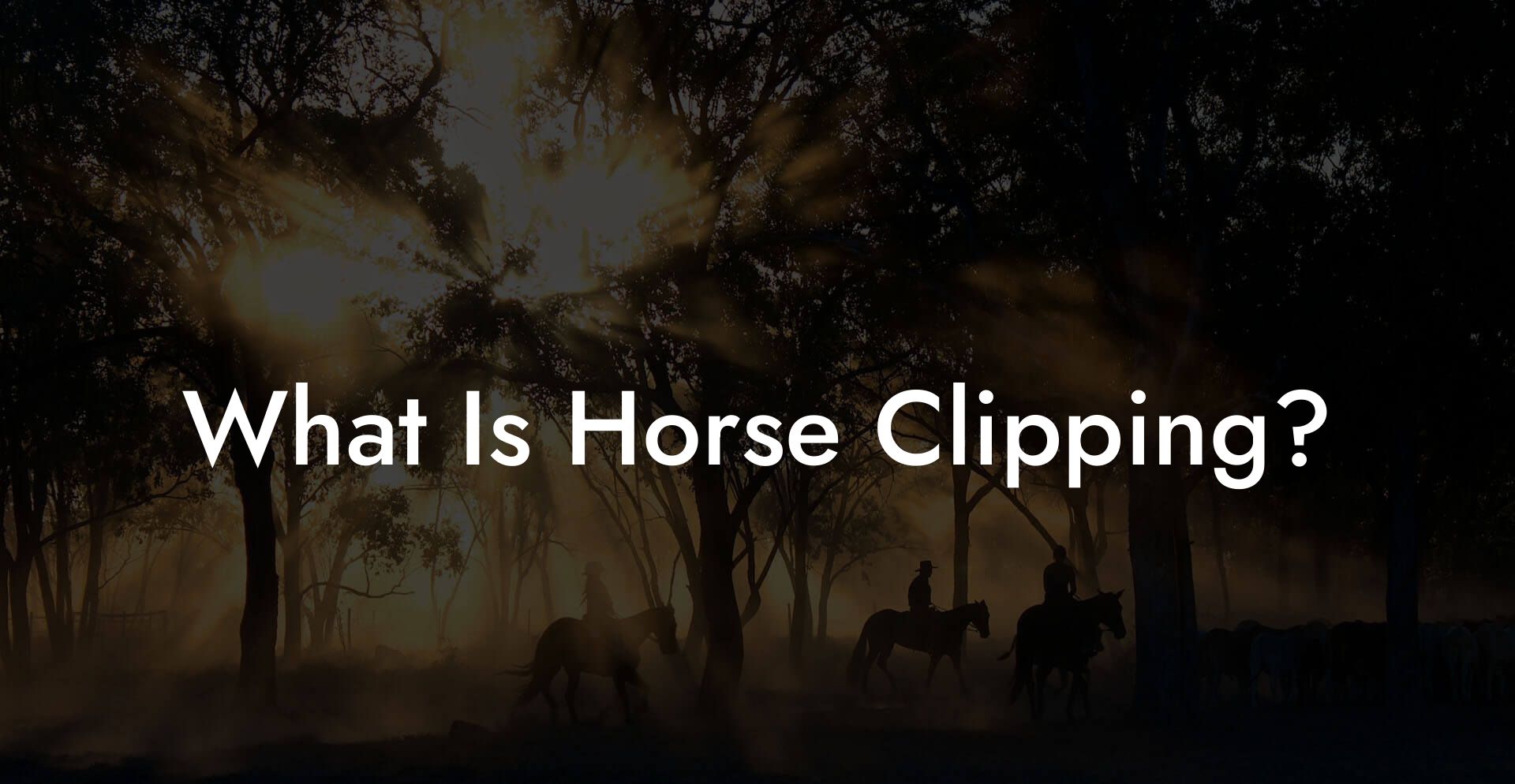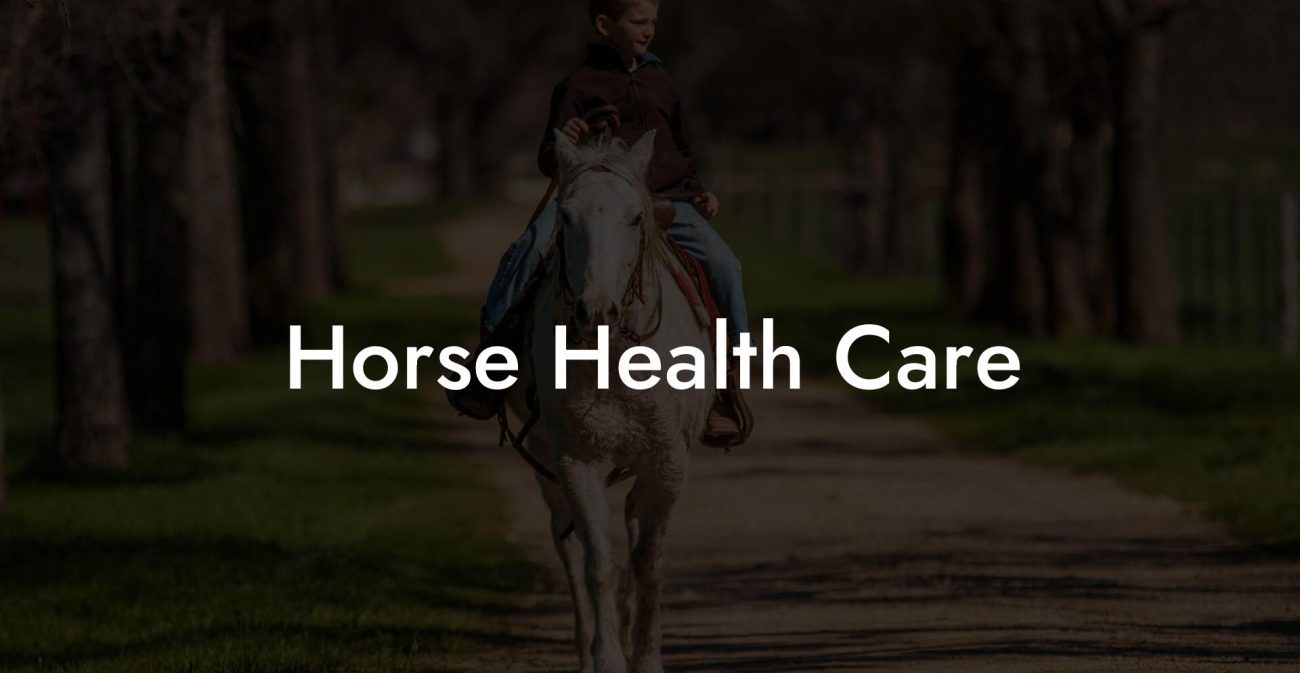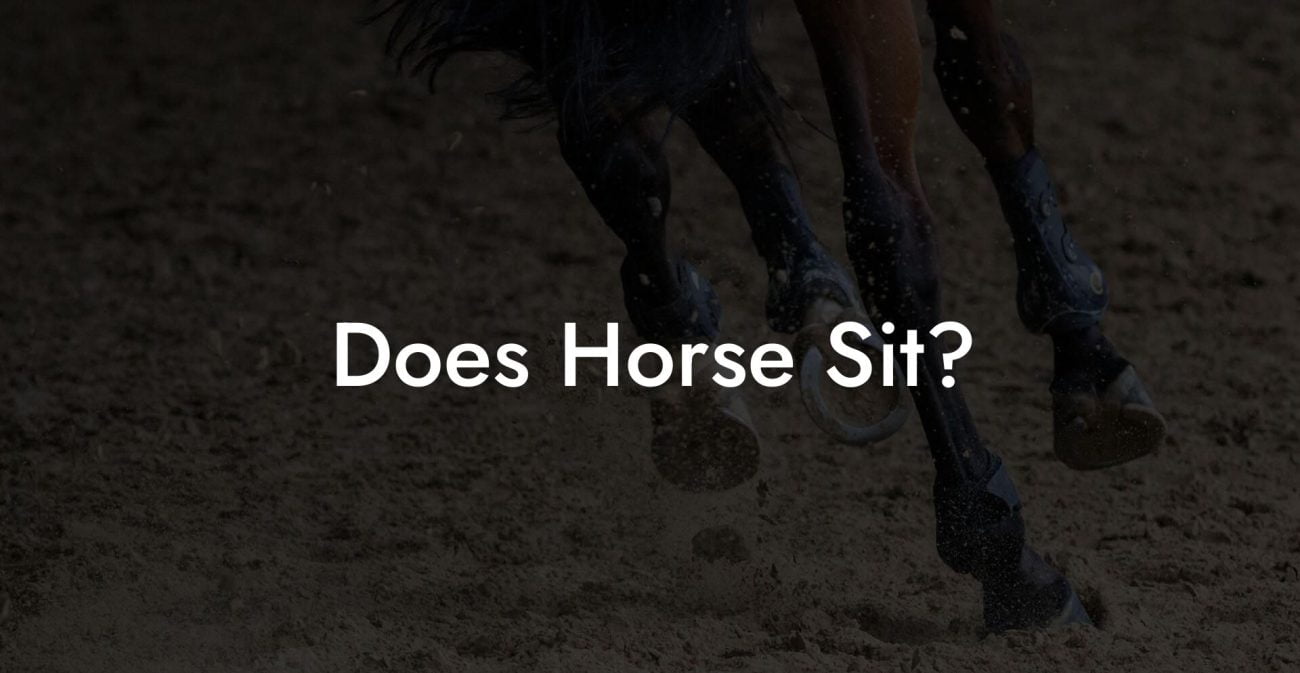It’s not every day that you stumble upon a horse racing odd as jaw-droppingly steep as 80 to 1, like finding a secret level in your favorite video game. If you’ve ever wondered what that bizarre ratio means on your betting slip or how it might affect both your wallet and the care you give to your equine buddy, then buckle up. We’re about to gallop into the thrilling nexus of high-stakes horse racing, longshot bets, and top-notch horse care advice tailored for the savvy Gen-Z and millennial crowd.
Quick Links to Useful Sections
- Understanding Horse Racing Odds: What Does 80 to 1 Mean?
- The Mechanics Behind Betting Odds in Horse Racing
- How Are Odds Calculated?
- Understanding the Risk and Reward
- Historical Context: Longshots That Defined the Sport
- The Risk-Reward Equation: When to Bet on an 80-to-1 Longshot
- Key Considerations for Betting on Longshots
- The Art and Science of Horse Racing: Beyond the Betting Slip
- The Importance of Training and Conditioning
- grooming, Nutrition, and Veterinary Excellence
- Bridging the Gap: Horse Racing Odds and Equine Wellness
- Emerging Trends: Tech, Social Media, and the New Generation of Horse Racing Fans
- Navigating the Racing Industry: The Business of Odds and Betting
- The Role of Parimutuel Betting
- Strategies for Betting on Longshots: When to Take an 80-to-1 Risk
- Bankroll Management
- Diversify Your Bets
- Do Your Research
- Trust Your Gut
- The Intersection of Horse Racing and Horse Care: A Holistic Approach
- A Balanced Diet for Peak Performance
- Structured Exercise and Training
- Mindfulness in the Stable
- Community and Resources: Your Next Steps in Horse Racing and Equine Wellness
- Frequently Asked Questions About 80 to 1 Odds and Horse Racing
- Your Journey into the Exciting World of Horse Racing and Equine Wellness
Understanding Horse Racing Odds: What Does 80 to 1 Mean?
In the fast-paced world of horse racing, odds are more than just numbers, they capture the essence of risk, reward, and the unexpected magic of underdogs triumphing against all expectations. When a race lists odds of 80 to 1, it means that for every $1 wagered, the payout (excluding your stake) is $80 if the horse wins. Essentially, if you back a longshot with 80 to 1 odds, a tiny wager could translate into a monstrous return, provided that miracle moment unfolds on race day.
These odds are set by bookmakers who assess an array of factors: a horse’s form, track conditions, jockey skill, and even the magic of unpredictable events. The underdog status of an 80-to-1 horse tells you it’s not favored by the experts, yet history has shown that the racecourse is notorious for its upsets. Think of it as rolling the dice in a game where the improbable can become reality.
For those new to horse racing betting, understanding these odds is key. Betting odds like 80 to 1 embody the ultimate high-risk, high-reward scenario, similar to investing in a startup that could either crash or skyrocket. And while it's tempting to chase that life-changing win, it’s also important to approach longshot bets with a mix of excitement and realism.
The Mechanics Behind Betting Odds in Horse Racing
To truly appreciate an 80-to-1 wager, it’s crucial to understand the mechanics behind betting odds. In horse racing, odds represent the probability of a specific outcome as estimated by bookmakers. They signal not only the potential payout if that outcome occurs but also imply the likelihood of that occurrence happening.
When you see odds of 80 to 1, the inference is that the horse in question is viewed as a longshot, a competitor that has only a slim chance of victory. However, that slim chance is precisely what stokes the excitement among bettors. It’s a reminder that even in a field filled with seasoned participants, there’s always a possibility for the unexpected.
How Are Odds Calculated?
Bookmakers calculate odds based on extensive research and data analysis. They pore over historical performance, track records, recent workouts, weather conditions, and sometimes even insider tips from trainers and jockeys. Once these factors are synthesized, an implied probability is assigned to each horse. In the case of 80-to-1 odds, the implied probability is roughly 1.23%, illustrating just how rare success might be.
While numbers are at the heart of the betting world, the untamed nature of horse racing means that even the most advanced statistical models can be thrown off by an unexpected burst of brilliance from a seemingly average horse. That’s what makes betting on an 80-to-1 longshot so alluring, the underdog performing against all odds.
Understanding the Risk and Reward
The high payout associated with longshot bets reflects the heightened risk taken by the bettor. When you lay down money on an 80-to-1 chance, you’re gambling on the unlikely. But if the horse indeed wins, the reward is massively disproportionate to your initial wager. This scenario is not unlike the thrill of discovering an indie band before they hit the mainstream, the payoff is not measured solely in dollars, but in the thrill of being ahead of the trend.
As with any form of gambling, managing your risk is crucial. Borrowing the language of horse care, it’s like ensuring your horse gets the right balance of nutrition and exercise, a well-maintained stable gives you better odds in the long run.
Historical Context: Longshots That Defined the Sport
Horse racing is steeped in history, replete with legendary races where longshot bets turned underdogs into household names. The allure of the longshot isn’t a recent phenomenon, it stretches back centuries, when bettors would cross their fingers hoping for that once-in-a-lifetime upset.
One of the most famous examples is that of Donerail, a horse that captured the imagination with his unlikely victory in the 1913 Kentucky Derby. Although the odds were astronomical, the win forever etched the notion that on any given day, anything could happen at the track.
When you see odds like 80 to 1, remember that they are part of a grand narrative, one in which the underdog can surprise even the most seasoned professionals. This narrative keeps the legacy of horse racing alive as a sport where history is made in the blink of an eye, and where every race holds a promise of the extraordinary.
The legacy of longshots also serves as a critical reminder for anyone involved in horse racing betting: it's not just about the numbers on the ticket; it's about the passion, the gamble, and the sheer unpredictability that makes each race a unique story waiting to be written.
The Risk-Reward Equation: When to Bet on an 80-to-1 Longshot
Betting on a horse with 80-to-1 odds is not for the faint of heart, it calls for a calculated evaluation of risk versus reward. At its core, such a bet is a high-stakes proposition, one that balances the low probability of success against the potential for a transformative win.
Just like managing a stable or fine-tuning your horse’s training regimen, placing a bet on a longshot requires discipline and strategic planning. You must consider your bankroll, your risk tolerance, and what you stand to gain if fortune smiles upon you. It’s all about finding that sweet spot where the excitement of a longshot aligns with a sensible, well-thought-out betting strategy.
Key Considerations for Betting on Longshots
- Know Your Limits: Just as you wouldn’t overfeed your horse or skimp on its exercise, set clear boundaries for your bets. Determine a sensible portion of your betting budget that you can comfortably risk on high-odds wagers.
- Do Your Homework: Analyze the horse’s training records, past performance, and current form. Even longshots have stories, sometimes, a horse that’s been overlooked on paper has hidden potential waiting to be unleashed.
- Balance Your Bets: Longshots are exciting, but they shouldn't dominate your betting strategy. Diversify your wagers by mixing in safer bets with those high-risk opportunities, much like giving your horse a balanced diet for optimal performance.
- Understand the Odds: An 80-to-1 bet implies an expectation of a 1.23% win rate. Recognize that while the winnings might be epic, the odds are steep, and plan your bets accordingly.
Ultimately, deciding to bet on an 80-to-1 longshot is a bit like deciding to challenge a champion with your scrappy underdog, a moment of bold defiance where you embrace the possibility of the extraordinary.
The Art and Science of Horse Racing: Beyond the Betting Slip
Horse racing is an intricate blend of art and science, where the variables behind each race extend far beyond mere statistics. For those who are passionate about both placing bets and caring for their very own equine companions, understanding this duality is paramount.
At its heart, horse racing is a sport fueled by adrenaline, strategy, and a deep appreciation for the animal’s performance. But there’s more to it than just watching a fast-paced competition. It’s about the love of horses, an appreciation for their training, health, and care that ultimately influences their performance on the track.
The Importance of Training and Conditioning
Much like a performance artist perfecting their act, horses require meticulous training and conditioning to excel. A well-cared-for horse not only competes better but also enjoys a longer, healthier life. From regular exercise to a balanced diet, every aspect of a horse’s routine can impact its performance on race day.
Innovative training methods that leverage data analytics, heart rate monitoring, and even wearables are now part of the modern equine world. These techniques enable trainers to refine workouts and detect any signs of stress or injury promptly. For the tech-savvy Gen-Z and millennial crowd, this is where tradition meets modernity, where cutting-edge technology and centuries-old training philosophies converge.
grooming, Nutrition, and Veterinary Excellence
Beyond training, the everyday care of a racehorse is an art form. Proper grooming, nutrition, and regular veterinary check-ups are all essential. Grooming is not just about aesthetics; it helps maintain healthy skin and muscle tone. A balanced nutrition plan, rich in proteins, vitamins, and minerals, fuels the horse’s performance and recovery, reducing the risk of injuries.
Just as you might research the pedigree and performance history before placing an 80-to-1 bet, the thorough care of your horse involves careful scrutiny of its diet, exercise, and overall wellness. With advanced veterinary care now available, early detection of issues and preventive measures have become more accessible, ensuring that your horse remains competitive and healthy both on and off the track.
Bridging the Gap: Horse Racing Odds and Equine Wellness
At first glance, the world of horse racing odds and the realm of horse care might seem two entirely separate worlds. However, they’re more intertwined than you might think. Betting odds like 80 to 1 often capture the public’s attention, but the foundation of any memorable race starts long before the starting gate opens, it begins in the stable.
The performance of a racehorse is the cumulative result of many factors: impeccable training, consistent care, a nutritious diet, and a supportive environment that minimizes stress. In a way, the story of an 80-to-1 longshot that suddenly comes to the fore is not just a narrative about chance; it’s also a tribute to the unseen hours of care and dedication behind the scenes. The same holistic approach that you apply when managing your daily horse care routines can also be seen in the preparation for race day.
For equine enthusiasts who love both the thrill of the race and the joy of horse ownership, this dual perspective enriches the experience. It cultivates an appreciation for not only the glamour of big payouts and thrilling finishes but also for the intense commitment required to care for these magnificent animals.
Emerging Trends: Tech, Social Media, and the New Generation of Horse Racing Fans
The horse racing world is anything but static, especially as it enters the digital age. A generation that grew up with smartphones, social media, and viral content is redefining how bets are placed, races are watched, and horses are cared for. For the modern enthusiast, the convergence of technology and tradition creates unprecedented opportunities.
Mobile apps now allow bettors to view live odds, place bets from anywhere, and even follow detailed analytics of each race. Social media platforms serve as dynamic forums where racing enthusiasts debate strategies, share real-time updates, and celebrate historic upsets, like that legendary moment when an 80-to-1 longshot defied the odds and captured hearts worldwide.
Simultaneously, digital advancements are transforming the equine care landscape. Wearable technology, precision nutrition apps, and advanced diagnostic tools empower horse owners to monitor their animal’s health meticulously. Whether it’s tracking daily exercise, monitoring recovery after a race, or sharing care tips in online communities, the blend of modern tech with traditional horse care practices is revolutionizing the industry.
For Gen-Z and millennials, this means that every aspect of horse racing, betting odds, race-day excitement, and equine wellbeing, is interlinked in a way that caters to both their digital lifestyles and their passion for authenticity.
Navigating the Racing Industry: The Business of Odds and Betting
Behind every race card and betting ticket lies a sophisticated business model where bookmakers and racing commissions meticulously set odds to balance the books. While an 80-to-1 bet might seem like an isolated, thrilling anomaly, it is woven into a broader tapestry of economic strategy.
Bookmakers use complex algorithms and historical data to set odds that not only reflect the horse’s current form but also try to account for unpredictable variables ranging from sudden weather changes to last-minute lineup shifts. This careful balancing act ensures that every race remains profitable for the house while still offering tantalizing opportunities for risk-taking bettors.
The Role of Parimutuel Betting
An essential part of the business side of horse racing is parimutuel wagering, where all bets are pooled together, and payoffs are determined by the total money wagered. Unlike fixed-odds betting, parimutuel bets mean that the payout for an 80-to-1 situation could vary depending on the amount of money in the pot. This system further underscores the dynamic balance of risk and reward inherent in horse racing.
For those who enjoy a deep dive into numbers and statistics, understanding how these pools shape the final odds offers an enriching layer of insight., it’s like deciphering a complex algorithm that not only impacts individual bets but also the overall health of the racing industry.
Strategies for Betting on Longshots: When to Take an 80-to-1 Risk
Betting on longshots like an 80-to-1 favorite isn’t just about flashing boldness, it's about employing a strategy that balances audacity with prudence. For many, the allure lies in the possibility of turning a tiny stake into a fortune, but the savvy bettor knows to use these opportunities judiciously.
Here are some strategies to consider:
Bankroll Management
Just as you wouldn’t overtrain your favorite horse, never over-stretch your betting fund. Allocate only a small portion of your total bankroll for these high-risk bets. This way, even if the longshot doesn’t come through, your overall investment remains sound.
Diversify Your Bets
Don’t put all your money on one improbable outcome. Spread your bets across a mix of favorites and longshots. This diversified approach not only mitigates risk but also ensures you remain in the game for the long haul, much like balancing your horse’s daily exercise with rest days.
Do Your Research
Whether you’re analyzing past performances, scrutinizing the weather forecast, or delving into the strategy of the jockey, knowledge is power. Use resources like racing form guides, expert commentary, and statistical analysis tools to make informed decisions. And if you’re also caring for your own horse, treat this research as you would monitor your horse’s health and progress.
Trust Your Gut
There’s an intangible thrill in betting on the underdog, and sometimes, your instincts might tell you there’s more to an 80-to-1 story than meets the eye. While data is critical, don’t hesitate to trust your gut feelings, just as you would when sensing that your horse is ready for a big race.
Betting on longshots is an art, one where strategy, research, and a dash of intuition converge to create moments of electrifying victory.
The Intersection of Horse Racing and Horse Care: A Holistic Approach
While many are drawn to the thrill of betting and the rush of high odds, the journey of horse racing isn’t confined to the track. The care and well-being of the horse are integral to its performance, a notion that resonates deeply with today’s horse enthusiasts.
Caring for a horse is a holistic process that involves proper nutrition, regular exercise, and a supportive environment, all of which contribute to its ability to perform against even the steepest odds. If you’re a horse owner, whether new to the scene or a seasoned caretaker, integrating the best practices of animal husbandry can directly enhance your horse's competitive edge.
A Balanced Diet for Peak Performance
Much like a well-calibrated bet, a balanced diet sets the stage for success. Quality hay, balanced grains, and appropriate supplements are the building blocks for a healthy, energetic horse. Pay close attention to your horse’s nutritional needs, and consult with a veterinary nutritionist if necessary, ensuring that every meal is both nourishing and designed to enhance athletic performance.
Structured Exercise and Training
Just as a longshot bet requires careful strategy, a horse’s training regimen must be both structured and dynamic. Incorporate regular workouts, varied routines, and rest periods to maximize performance while preventing injury. Whether you’re working on speed drills, endurance training, or agility exercises, consistency is key. The same approach can be applied to managing your betting strategy: structure mixed with flexibility.
Mindfulness in the Stable
Modern approaches to horse care also emphasize the mental well-being of your equine companion. Stress can reduce performance and lead to health issues, so creating a calm and nurturing stable environment is essential. Techniques such as regular hand-grooming, gentle massage, and ensuring a stress-free routine can help keep your horse relaxed and focused, paralleling the mental discipline required to manage high-stakes betting.
Viewing horse racing and horse care as two parts of the same holistic ecosystem not only enriches your understanding of the sport but also ensures that your prized equine remains in peak condition, both on the track and in everyday life.
Community and Resources: Your Next Steps in Horse Racing and Equine Wellness
Venturing into the worlds of high-stakes betting and dedicated horse care can feel overwhelming, but you’re not alone. Countless communities, online forums, and local clubs are dedicated to discussing everything from the mystique of an 80-to-1 bet to the essential routines for keeping your horse in top shape. These networks provide invaluable advice, shared experiences, and the latest trends in both industries.
Here are some actionable next steps to deepen your journey:
- Join Online Communities: Platforms like Reddit, specialized Facebook groups, and dedicated forums allow you to connect with fellow enthusiasts who share tips on betting strategy and equine care.
- Follow Industry Influencers: Social media is brimming with experts who offer insights into the latest racing trends, technological innovations, and practical horse care advice.
- Attend Local Races and Workshops: Whether it’s for the thrill of the race or an equine care seminar, engaging in live events can boost your knowledge and confidence in both arenas.
- Explore Educational Resources: Many websites and online courses are geared toward new horse owners, betting beginners, and those interested in advanced equine veterinary care.
By tapping into these resources, you’ll not only refine your betting strategies but also cultivate a deeper connection with your horse and the broader community that shares your passion.
Frequently Asked Questions About 80 to 1 Odds and Horse Racing
Got questions buzzing around your mind like a race-day crowd? Here are some of the most frequently asked questions to help clarify the mystique behind an 80-to-1 wager and the vibrant world of horse racing.
1. What does 80 to 1 mean in the context of horse racing?
It means that for every $1 you bet, you would earn $80 in profit if the horse wins. Essentially, it indicates that the horse is considered a longshot, with only about a 1.23% chance of winning.
2. Why would anyone bet on a horse with such daunting odds?
Betting on longshots, like those offering 80 to 1 odds, is all about the thrill and potential reward. While the risk is high, the payoff in the event of an upset can be life-changing. It’s similar to taking a calculated risk on a promising startup.
3. How are these odds determined?
Bookmakers use extensive data that includes the horse’s past performance, track conditions, jockey performance, and more to assess the likelihood of a horse winning. The resulting odds reflect this careful balance of risk and reward.
4. Can an 80-to-1 underdog really win a race?
Absolutely. History shows that upsets are a memorable part of horse racing. While the chances are slim, events like these remind everyone that in racing, the unexpected can and does happen.
5. What factors besides the odds should I consider when betting on a longshot?
Besides the numerical odds, consider the horse’s recent form, the trainer’s reputation, track conditions, and the expertise of the jockey. Doing thorough research can help identify longshots that might be undervalued.
6. How can I manage my bankroll when betting on longshot odds?
Set a budget for your bets, diversify your wagers, and only allocate a small portion of your funds to high-risk bets like 80-to-1 wagers. This approach protects you financially while allowing for the thrill of a high payout.
7. In what ways do equine care and racing performance intersect?
A horse’s health, nutrition, training, and overall well-being directly affect its performance on the track. A well-cared-for horse is more likely to perform at its best, and many horse owners now utilize innovative techniques and technology to optimize both racing and everyday health.
8. Are longshot bets popular among experienced bettors?
Yes, seasoned bettors often mix longshot wagers with more conservative bets. It’s an important strategy in diversifying risk and capitalizing on those rare but lucrative wins.
Your Journey into the Exciting World of Horse Racing and Equine Wellness
Whether you’re a die-hard racing fan chasing the underdog win or a dedicated horse owner striving to provide the best care, diving into the world of horse racing odds and equine wellness can be an exhilarating adventure. The thrill of spotting an 80-to-1 longshot is rivaled only by the satisfaction of witnessing your well-cared-for horse shine on race day.
Embracing the art and science behind betting, training, and care offers a holistic approach to both the sport and the well-being of your four-legged friends. It’s about striking the perfect balance between calculated risks and steadfast care, ensuring that the passion you bring to your racing strategy is matched by the commitment you invest in your horse’s health.
Engage with communities, absorb wisdom from seasoned professionals, and never stop learning. Whether you're deciphering the intricate mathematics behind longshot odds or fine-tuning your horse’s training regimen, every step is a stride toward success and fulfillment.
Your quest for thrilling victories and optimal equine wellness is just beginning, immerse yourself in the wealth of knowledge available, experiment with innovative strategies, and celebrate even the small wins along the way. After all, every champion race and every healthy, happy horse is a testament to your passion and perseverance.
So, gear up and get ready to be a part of a community where exhilarating bets meet dedicated care, a journey where the spirit of competition and the love for horses intertwine to create a legacy of excitement, learning, and true equine excellence.

